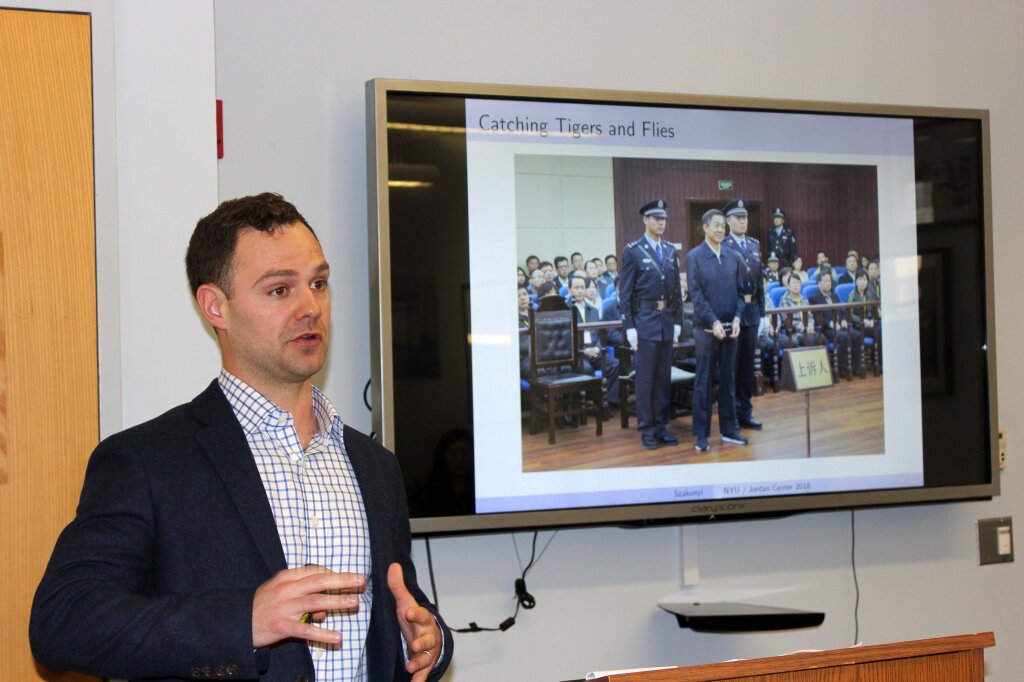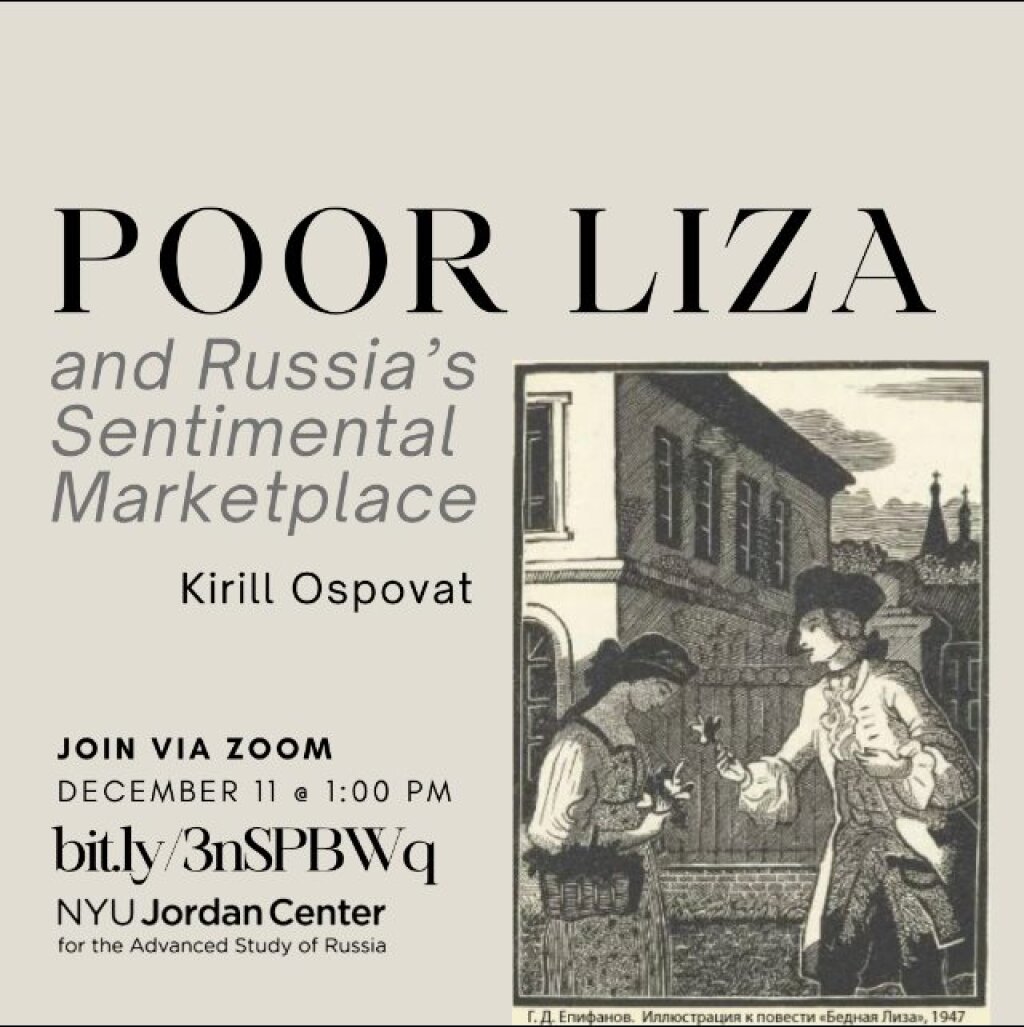Watch the event video here
National anti-corruption campaigns are in fashion. Last year, Saudi Crown Prince Mohammad bin Salman confined dozens of princes and officials to Riyadh’s Ritz-Carlton on corruption charges, including the billionaire Al-Waleed bin Talal; Al-Waleed was released only in late January. China under Xi Jinping has prosecuted thousands of “tigers and flies”—that is, both high-ranking leaders and lower-level officials, the former including members of the powerful Central Committee.
Critics point out that such campaigns may serve purposes besides expunging corruption. Both Mohammad bin Salman and Xi Jinping have used their campaigns to target rivals and consolidate power, for example.
“There might be a lot of reasons to be skeptical whether or not these anti-corruption campaigns are having any impact,” said David Szakonyi during a talk at the Jordan Center on February 21. “There’s tons of ulterior motives as well as political costs in going after and arresting people that make up the structure of your regime, these high-level bureaucrats that have been stealing under your nose.”
Nonetheless, Szakonyi presented research on Russia’s anti-corruption efforts that suggested, first, that the Kremlin’s motives are more than cynical political maneuvers and, second, that they have had a significant effect on lower-ranking municipal officials. The Jordan Center and NYU’s Department of Politics jointly sponsored the talk by Szakonyi, who is an associate professor at George Washington University.
Russia began to roll out anti-corruption measures in 2008, at the start of Dmitry Medvedev’s single term as president. Following the example of other countries, Russia imposed financial disclosure requirements for public officials. The new rules forced officials to disclose their assets and expenditures in a variety of categories every year, as well as those of their spouses and children. This created a problem for corrupt incumbents, as well as prospective candidates with histories of tax evasion, Szakonyi said. Suddenly holding or running for office meant risking the exposure of one’s misdeeds. What’s more, law enforcement appeared serious about investigating and punishing infractions.
Russia’s new financial disclosure regime rolled out in stages. At first, it applied only to full-time municipal deputies, who typically form a minority on local governing bodies. Only in 2015 did the law expand to include part-time deputies, too. Szakonyi took advantage of this expansion to measure whether Russia’s financial disclosure laws dissuaded incumbents from running for re-election. Szakonyi found that the 2015 measure was associated with a 25 percent drop in the number of part-time incumbents seeking re-election—presumably because they feared the scrutiny of their finances that remaining in office would now entail.
Szakonyi also found essentially no difference in this trend between deputies belonging to the ruling United Russia party, which is associated with President Vladimir Putin, and opposition deputies. This suggests that law enforcement agencies have applied the law fairly; financial disclosure requirements are more than simply a stick with which to beat opposition candidates. However, this prompts the question of why Russia’s top leadership, which itself has a reputation for backroom deals and offshore accounts, is carrying out a country-wide anti-corruption campaign with something like impartiality.
One possible explanation is that financial disclosures provide ruling elites with useful information, Szakonyi said.
“These disclosures create this incredible amount of information about cadres for authoritarian regimes, and it can be used in the future to manage the bureaucracy going forward,” Szakonyi said. “I think that this disclosure is now becoming one of the principle tools that the Putin regime is using to manage the government.”
The fact that only a portion of officials’ financial information is made publicly available might support this reasoning. By keeping the majority of financial data for itself, the government strengthens control of its cadres.
Szakonyi also said that the Kremlin may be responding to a real demand for accountability among the public. Unless the government takes measures to crack down on corruption, particularly at the local level where Russians encounter it on a routine basis, Putin risks opposition forces coalescing around anti-corruption activism.
Szakonyi noted that the decrease in part-time incumbents running for re-election only appeared in regions of Russia where the risk of an audit was high. In other words, financial disclosure requirements only prompted corrupt deputies to leave office when there was a risk of getting caught.
“The interaction that we’re looking at is basically only coming through where there’s a high propensity to get audited in your region,” Szakonyi said. “When tax authorities are active, you see the law actually have bite.”
Szakonyi also said that his research likely shows a short-term effect, that within a few years officials will likely have found alternate, safer methods for siphoning off public funds or enriching their networks. Yet, those methods might entail greater costs, reducing overall corruption in the longer term.
Throughout his talk, Szakonyi engaged in a lively back-and-forth with the packed audience. One commentator asked whether the decrease in incumbents running for re-election after 2015 might be related to the economic slump Russia entered as a result of Western sanctions. Szakonyi answered that most of the damage had already been done by the point, in late 2015, that financial disclosure requirements expanded to cover part-time deputies, too. Therefore, Szakonyi’s pre-expansion data would already reflect whatever effect Russia’s recession had on officials’ re-election calculus.



